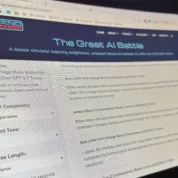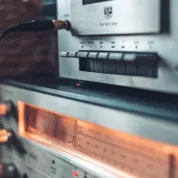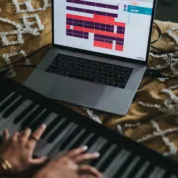
Artificial intelligence (AI) has rapidly evolved over the past decade, leading to groundbreaking innovations in various fields. In the world of music, AI is opening up new possibilities for artists, like our new My Studio feature which allows musicians to receive custom tailored music advice to meet their specific goals. AI integrated music tools are empowering musicians to push creative boundaries and redefine the way music is created and experienced. With AI now in music production, we are witnessing a paradigm shift that is transforming the industry from the ground up.
Welcome to the exciting new world of AI music generators! It is a fascinating one to explore. To truly appreciate this emerging technology, we'll need to explore the mechanics of AI music generation and its applications in music production. We'll explore five innovative uses, from lyric generation to music video creation, and sample songs crafted by AI. We'll also introduce you to five apps that use AI to create music, that you can use to enhance your music production experience.
What is an AI Music Generator?
Algorithms and Machine Learning
An AI music generator is pretty much what it sounds like... Software that creates music by using Artificial Intelligence. How it accomplishes this however, can get pretty complex. But we'll try to break it.
AI programs run algorithms to analyze patterns in large datasets of existing music, learning from them to come up with new arrangements that it identifies as unique yet coherent. This process is called machine learning, the core technology behind AI music generators. The dataset being analyzed can include various genres, styles, and moods, allowing the AI to develop a comprehensive understanding of music theory and structure. Once trained, the AI can generate new music based on the patterns and relationships it has learned from the dataset.
There are different types of AI music generators. Some focus on specific aspects of music, such as melody or rhythm, creating individual parts of an arrangement, or samples for use in music production. While others, like OpenAI's MuseNet, can create entire compositions from scratch. Some are designed for specific genres, while others can adapt to multiple genres and styles, giving users different options to use to suit their preferences and requirements.
The History of AI Music Generators
Explorations of AI in music date all the way back to the 1950s, when the first experiments with computer-generated music were taking place. A notable early example is the Illiac Suite, a string quartet composed by Lejaren Hiller and Leonard Isaacson in 1957, using the ILLIAC I computer at the University of Illinois.

In the following decades, AI research in music focused on rule-based systems and algorithmic composition, such as David Cope's Experiments in Musical Intelligence (EMI) in the 1980s, which generated music in the style of famous composers.
The advent of machine learning and neural networks in the 1990s and 2000s led to more sophisticated AI music systems, including Melomics, an AI composer that created a vast catalog of music without human intervention.

More recent advancements in deep learning techniques, such as Google's Magenta project and OpenAI's MuseNet, have allowed for even more advanced and versatile AI music generation, blending styles, and pushing the boundaries of creativity.
How are AI Music Generators being used?
Today, AI has become an integral part of the music landscape, with applications ranging beyond composition and production to analysis, education and more. New approaches are not only expanding creative possibilities, but also reshaping traditional methods.
Here are some ways AI music generators are making a mark in the industry:
- Original Music Composition: AI tools can help create new melodies, chord progressions, and rhythms, which can serve as a starting point for composing original music. With the ability to generate unique musical ideas, these tools can spark creativity and inspire musicians to explore new avenues in their compositions.
- Songwriting Assistance: By analyzing existing song structures and lyrics, AI generators can help musicians come up with new ideas and lyrical content for their songs. This can be particularly useful for overcoming writer's block and generating fresh concepts that align with the musician's artistic vision.
- Arrangement Enhancing: AI music generators can help producers experiment with different instrumentations and arrangements by providing suggestions and alternatives. This can streamline the production process and allow producers to focus on refining their creative ideas.
- MIDI Track Generation: AI music generators can create MIDI tracks for different instruments, which can be imported into digital audio workstations (DAWs) for further editing and mixing. This can save time during the music production process and provide a solid foundation for building complex arrangements.
- Collaboration with Human Musicians: AI tools can be used alongside human musicians to create unique and innovative compositions that combine the best of both worlds. By working together, AI and human musicians can push the boundaries of music creation and explore uncharted creative territories.
- Creating Adaptive Music: AI music generators can be used to create adaptive music, which responds to changes in the environment or user input. This type of music can be particularly useful for video games, interactive installations, and virtual reality experiences, where the music needs to adjust seamlessly to match the on-screen action or user's interactions.
- Film Scoring and Sound Design: AI-generated music can be used for film scoring and sound design, providing unique, customized soundtracks that fit the mood and tone of a scene. This can save time and resources, especially for indie filmmakers and small-scale productions.
- Music Education: AI music generators can be used as educational tools, helping students understand music theory and composition by analyzing and generating music based on specific parameters. This hands-on learning experience can make music education more engaging and accessible.
- Algorithmic DJing: AI can be used to create seamless transitions and mashups between tracks, providing a unique and personalized listening experience for users. This can be particularly useful for creating playlists, radio stations, and live DJ performances.
This list is by no means exhaustive. By using AI to create music artists are reshaping traditional methods of production, offering endless possibilities for creative expression and innovation. As AI technology continues to evolve, we can expect more groundbreaking AI related developments in the music of the future.
What is an example of a song created by AI?
As AI technology continues to advance, the diversity and sophistication of the examples it produces continues to emerge as well, pushing the boundaries of creativity in the music industry. Multiple artists are already using AI to create music of the future, and showcasing the huge potential of this innovative technology. You can find these examples on platforms like the AI Song Contest, where participants submit original songs created using AI tools, or on more common sites such as YouTube or SoundCloud.
A few notable AI generated music examples are:
Daddy's Car
One of the first songs to be composed entirely by an AI system is "Daddy's Car," created by the AI system Flow Machines in collaboration with French composer Benoît Carré. The song was created by analyzing the musical styles of The Beatles and other artists from the 1960s, resulting in a catchy and nostalgic tune, with a bit of a dreamy vibe. This accomplishment showcases the potential of AI to create music that is not only unique but also appealing to a wide audience.
Break Free
Another example is "Break Free," a pop song created by AI software called Amper in collaboration with singer-songwriter Taryn Southern. The AI generated the instrumental track, while Southern wrote the lyrics and melody. The resulting song demonstrates how AI can be used in tandem with human creativity to produce engaging and innovative music.
These examples are just the tip of the iceberg, as AI-generated music continues to gain traction in various genres, from classical to electronic. As AI technology advances, we can expect more sophisticated and versatile music generation tools that will further reshape the landscape of music production.AI song lyric generators analyze existing lyrics and use natural language processing (NLP) techniques to create new lyrics in various styles, themes, and genres. These tools can help songwriters overcome writer's block and come up with fresh and innovative ideas for their songs. By providing suggestions and alternatives, AI lyric generators can spark creativity and inspire songwriters to think outside the box.
5 Ways You Can Use AI Music Generators
In the highly competitive music industry, having an advantage can make all the difference. That makes it the perfect time to start learning how AI music generators can benefit your music. By learning how to use AI to create music you're getting ahead of the curve, to start making the music of the future today! Familiarizing yourself with these tools, you can set yourself apart from the competition and unlock new creative possibilities for your music.
1. AI Song Lyric Generators
AI song lyric generators analyze existing lyrics and use natural language processing (NLP) techniques to create new lyrics in various styles, themes, and genres. These tools can help songwriters overcome writer's block and come up with fresh and innovative ideas for their songs. By providing suggestions and alternatives, AI lyric generators can spark creativity and inspire songwriters to think outside the box.
2. AI Music Composers
AI music composers use machine learning algorithms to analyze musical patterns and generate new compositions in different genres and styles. These tools can assist composers in creating original music or help them experiment with different ideas and approaches. By providing a virtually endless supply of unique musical ideas, AI music composers can significantly enhance the creative process and enable composers to explore new artistic directions.
3. AI Music Generators for MIDI Creation
AI music generators can create MIDI tracks for various instruments, allowing musicians and producers to import these tracks into their DAWs for further editing, arranging, and mixing. This can be a valuable resource for those who need inspiration or want to save time during the music production process. By providing a solid foundation for building complex arrangements, AI-generated MIDI tracks can streamline the music production workflow and allow musicians to focus on refining their creative ideas.
4. AI music video generator
AI music video generators use machine learning algorithms to analyze the audio of a song and generate visuals that sync with the music. These tools can help musicians create visually appealing music videos without investing a lot of time and effort in traditional video production methods. By providing a unique and personalized visual experience, AI music video generators can enhance the overall impact of a song and help musicians connect with their audience on a deeper level.
5. AI Music Analysis
AI music analysis tools use machine learning algorithms to analyze existing songs and provide insights into their structure, melody, harmony, and rhythm. These tools can help musicians and producers understand the intricacies of a particular song or genre, allowing them to create better and more innovative music. By dissecting the elements that make a song successful, AI music analysis tools can help musicians develop their skills and knowledge, ultimately elevating their craft.
5 AI Music Generator Apps You Should Try
With the ability to analyze patterns in existing music and generate new compositions, lyrics or MIDI tracks, these tools are a powerful addition to any musician's toolkit. Jump in! Conduct your own thorough research to find out which AI apps and integrations best meet your needs. The 5 generator tools listed below are a great place for you to start using AI to create music. And one may be a surprise, that has been right under your nose all along!
1. OpenAI's MuseNet
MuseNet is a deep neural network that can generate music in various styles and genres, from classical to pop. It can create compositions with multiple instruments and even mimic the style of famous composers. MuseNet allows users to input specific parameters, such as desired genre, composer, and instruments, providing a highly customizable music generation experience.
3. Amper Music
Amper Music is an AI music generator that allows users to create unique and customized music for their projects. It can be used to create background music for videos, podcasts, and other multimedia content. Amper Music offers an intuitive interface and a wide range of customization options, enabling users to tailor the generated music to their specific needs and preferences.
4. LyricStudio
LyricStudio is an AI-powered song lyric generator that can help songwriters come up with new lyrics for their songs. It uses NLP techniques to analyze existing lyrics and generate new lines based on the user's input. With a user-friendly interface and a vast database of lyrical content, LyricStudio can be a valuable tool for songwriters looking to expand their creative horizons.
5. Magenta Studio
Developed by Google's Magenta team, Magenta Studio is a suite of AI music tools that includes melody generators, drum generators, and music interpolators. These tools can be used as plugins in popular DAWs like Ableton Live, helping musicians create and experiment with new musical ideas. Magenta Studio also offers an open-source platform, encouraging developers and musicians to collaborate and contribute to the ongoing development of AI music technology.
6. Band Pioneer
Although not a music generator, we've been dabbling with AI here at Band Pioneer as well. The "Enter a Question" search box on our homepage is powered by Chat GPT. It enables us to provide detailed responses to any music-related question you might have. If we have site content related to your question, it incorporates that into the answer for enhanced insight, and the option to message us if we don't. But regardless, no question goes unanswered. And that helps us meet our goal of equipping musicians with the tools they need to success - that's the power of AI!
Final Thoughts
AI music generators are revolutionizing the industry, creating music of the future, and providing new opportunities for artists and producers to explore creative avenues in their compositions. As the technology behind AI music generators advances, so do the possibilities for musicians and producers to create unique and innovative music compositions. The different applications of these generators, from original music composition to algorithmic DJing, present a range of benefits for musicians, ranging from streamlining the production process to creating adaptive music that responds to changes in the environment or user input.
As the music industry continues to evolve and become more competitive, musicians who use AI to create music will have the upper hand. At Band Pioneer we're deeply involved in this as well, from researching our own AI music compositions, to integrating Chat GPT into our website. Our "Ask a Question" search feature is one of the richest music search features online, returning optimal search results infused with AI solutions. And our new My Studio page serves up custom tailored AI assisted advice for musicians based on their unique skillsets and goals. Make sure to check back often for the latest industry AI-related insights.
Interested in trying out My Studio? Select your role to get started:
- Singer
- Guitarist
- Bassist
- Keyboardist
- Drummer
- Producer
- Sound Engineer
- I don't know what I am, just let me try it!
By keeping up with the latest music industry developments and exploring the different tools and applications available, you can stay ahead of the curve and gain a competitive edge. Whether it's through AI song lyric generators, AI music composers, or the plethora of other AI tools, there are a wide range of ways that AI can be used to enhance and elevate your music production and performance experiences. So jump in! And start exploring the possibilities of Artificial Intelligence!







Leave a Reply!
It is remarkable, rather valuable piece
It is very a pity to me, I can help nothing to you. I think, you will find the correct decision.
And I have faced it. Let's discuss this question.
How are AI generators affecting the traditional dynamics of song composition? Like what implications do they have for the role of human musicians?
That My studio feature on this site is great! How did you do teh custom advice?
Everybody friggin out over AI
While AI music generators have the potential to revolutionize music creation and production, it also raises questions about the role of human creativity and expression in the arts. Nevertheless, it's an intriguing development to follow.
We appreciate the input! AI's impact on the future of humanity is something a lot of great minds are questioning right now for sure.
As an avid music lover, it's incredible to see the advancements in AI music generators and the potential impact on the music industry. Can't wait to see where this technology takes us!
Agreed. Thanks for the response!